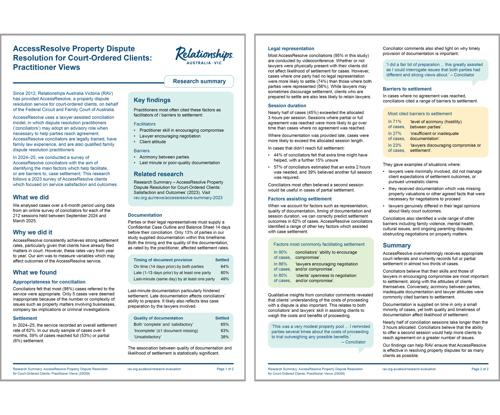Understanding what drives settlement in property dispute resolution
13 October 2025
We’re pleased to share our new research summary, ‘AccessResolve Property Dispute Resolution for Court-Ordered Clients: Practitioner Views’, recently launched at the 2025 National Mediation Conference.

Relationships Australia Victoria has provided the AccessResolve property dispute resolution service on behalf of the Federal Circuit and Family Court of Australia since 2012. AccessResolve uses a lawyer-assisted conciliation model, in which practitioners may adopt an advisory role when necessary to help parties reach agreement. The service consistently achieves strong results, with settlement reached in almost two thirds of cases.
The aim of our research was to measure variables which may affect outcomes of the service. We analysed all AccessResolve cases over a 6-month period using data from an online survey of conciliators. We looked at factors affecting likelihood of settlement, including whether one or both parties were legally represented, the quality and timeliness of the case outline and balance sheet that each party must supply in advance of a conciliation, and the attitudes of lawyers and clients.
Key findings
Practitioners most often cited the below factors as the main facilitators and barriers to settlement.
Facilitators
- Practitioner skill in encouraging compromise
- Lawyer encouraging negotiation
- Client attitude
Barriers
- Acrimony between parties
- Last minute or poor-quality documentation
These finding offer valuable insights into how practitioner expertise, client engagement, and preparation can significantly influence outcomes in property dispute resolution.
‘Our findings will help RAV ensure that AccessResolve supports property dispute resolution for as many court-ordered clients as possible, so that they can avoid returning to court.’ – Dr Genevieve Heard (Manager Research).